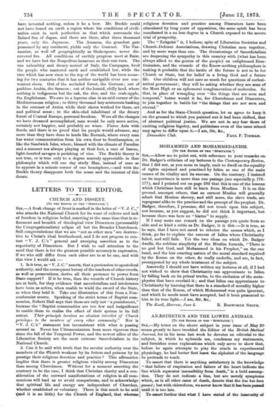LETTERS TO THE EDITOR.
CHURCH AND DISSENT.
(ro THE EDITOR OF THE 0 SPECTATOR.") SIR,—A fresh change of front is marked in the letter of "V. J. C.," who attacks the National Church for its want of culture and lack of freedom in religious belief, asserting at the same time that in re- finement and breadth of theological view Dissenters (presumably the Congregationalists) eclipse all but the Broader Churchmen. Self-congratulations that we are "not as other men " are destruc- tive to Christ's ideal brotherhood, and I do not propose to con- test "V. J. C.'s" general and sweeping assertion as to the superiority of Dissenters. But I wish to call attention to the need that there is for the greatest possible accuracy in expression, if we who still differ from each other are to at be one, and with this view I would ask :-
1. Is it true, as "V. J. C." asserts, that a pretension to apostolical authority, and the consequent heresy of the teachers of other creeds, as well as persecutions, derive all their pretence to power from State support? If it be true, then the records of Church history are at fault, for they evidence that sacerdotalism and intolerance have been as active, when unable to wield the sword of the State, as when they held it. Take one illustration of this from a Non- conformist source. Speaking of the strict terms of Baptist com- munion, Robert Hall says that these are only not "a punishment," because the "Baptist communities are too few and insignificant to enable them to realise the effect of their system in its full extent. Their principle involves an absolute interdict of Church privileges to the members of every other community." Nor is "V. J. C.'s " statement less inconsistent with what is passing around us. Never has Ultramontanism been more vigorous than since the fall of the Temporal Power, and the newest allies of the Liberation Society are the most extreme Sacerdotalists in the National Church.
2. Can it be said with truth that the secular authority over the members of the ehurch weakens by its fetters and poisons by its prestige their religious devotion and practice ? This affumation implies that there is greater religious vitality among Dissenters than among Churchmen. Without for a moment asserting the contrary to be the case, I think that Christian charity and a con- sideration of the outward manifestations of religion in all com- munions will lead us to avoid comparisons, and to acknowledge that spiritual life and energy are independent of Churches, whether established or voluntary. There is this much to be said (and it is no little) for the Church of England, that whereas
religious devotion and practice among Dissenters have been stimulated by long years of opposition, the same spirit has been manifested in a no less degree in a Church exposed to the severe trial of prosperity.
The " Zeitgeist " is, I believe, spite of Liberation Societies and Church-Defence Associations, drawing Christian men together, and by more ways than one. The threate.nings of Sacerdotalisn. are deepening the sympathy in this country with (what has been always allied to the genius of the people) an enlightened Eras- tinianism, and the crusade of the Know-nothing philosophers is. making it probable that the battle of the future is not to be for Church or State, but for belief in a living God and a future life. Our children will not care so much for questions of ecclesi- astical government ; they will be asking whether they are sons of the Most High or an ephemeral conglomeration of molecules. So that, in place of wrangling over "the things that are seen and temporal," better would it he, -for Churchmen and Dissenters,. to join together in battle for "the things that are not seen and eternal."
And as for the State-Church question, let us agree to keep it on the ground to which you pointed out it had been shifted, that of abstract political justice. We are not in any fear there of exciting religious bigotry, and politicians even of the same school may agree to differ upon it.—I am, Sir, &c.,


































 Previous page
Previous page